
Backgammon is a two-player board game played with counters and dice on tables boards. It is the most widespread Western member of the large family of tables games, whose ancestors date back at least 1600 years. The earliest record of backgammon itself dates to 17th-century England, being descended from the 16th-century game of Irish.

Shogi, also known as Japanese chess, is a strategy board game for two players. It is one of the most popular board games in Japan and is in the same family of games as Western chess, chaturanga, xiangqi, Indian chess, and janggi. Shōgi means general's board game.

Steve Jackson Games (SJGames) is a game company, founded in 1980 by Steve Jackson, that creates and publishes role-playing, board, and card games, and the gaming magazine Pyramid.
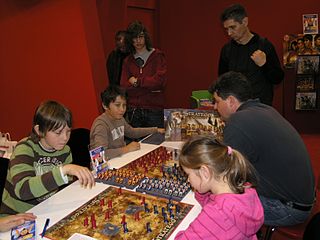
Stratego is a strategy board game for two players on a board of 10×10 squares. Each player controls 40 pieces representing individual officer and soldier ranks in an army. The pieces have Napoleonic insignia. The objective of the game is to either find and capture the opponent's Flag or to capture so many enemy pieces that the opponent cannot make any further moves. Stratego has simple enough rules for young children to play but a depth of strategy that is also appealing to adults.
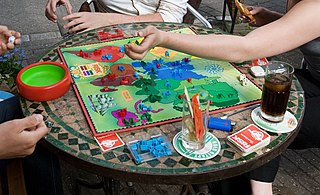
Risk is a strategy board game of diplomacy, conflict and conquest for two to six players. The standard version is played on a board depicting a political map of the world, divided into 42 territories, which are grouped into six continents. Turns rotate among players who control armies of playing pieces with which they attempt to capture territories from other players, with results determined by dice rolls. Players may form and dissolve alliances during the course of the game. The goal of the game is to occupy every territory on the board and, in doing so, eliminate the other players. The game can be lengthy, requiring several hours to multiple days to finish. European versions are structured so that each player has a limited "secret mission" objective that shortens the game.
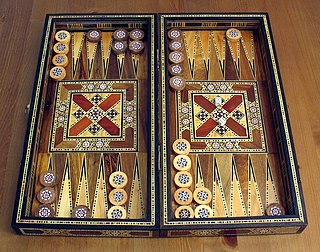
Tables games are a class of board game that includes backgammon and which are played on a tables board, typically with two rows of 12 vertical markings called points. Players roll dice to determine the movement of pieces. Tables games are among the oldest known board games, and many different varieties are played throughout the world. They are called 'tables' games because the boards consist of four quadrants or 'tables'. The vast majority are race games, the tables board representing a linear race track with start and finish points, the aim being to be first to the finish line, but the characteristic features that distinguish tables games from other race games are that they are two-player games using a large number of pieces, usually fifteen per player.

Liubo was an ancient Chinese board game for two players. The rules have largely been lost, but it is believed that each player had six game pieces that were moved around the points of a square game board that had a distinctive, symmetrical pattern. Moves were determined by the throw of six sticks, which performed the same function as dice in other race games.

Trouble is a board game in which players compete to be the first to send four pieces all the way around a board. It is based on a traditional game called "Frustration" played on a wooden board with indentations for marble playing pieces and rules similar to Parcheesi. Pieces are moved according to the roll of a die using a contained device called a "Pop-O-Matic".
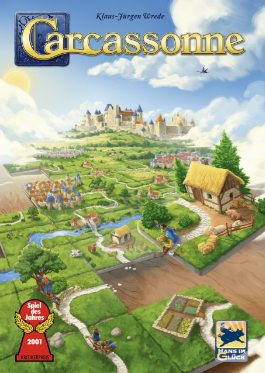
Carcassonne is a tile-based German-style board game for two to five players, designed by Klaus-Jürgen Wrede and published in 2000 by Hans im Glück in German and by Rio Grande Games and Z-Man Games (currently) in English. It received the Spiel des Jahres and the Deutscher Spiele Preis awards in 2001.
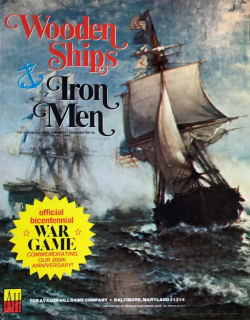
Wooden Ships and Iron Men is a naval board wargame simulating naval combat during the Age of Sail that was published by Battleline Publications in 1974, then revised and republished by Avalon Hill the following year.

Top Secret Spies is a spy-themed German-style board game designed by Wolfgang Kramer and published in 1984 by Ravensburger. The game, also known as Under Cover or Detective & Co, won the Spiel des Jahres award in 1986.

Chaturaji is a four-player chess-like game. It was first described in detail c. 1030 by Al-Biruni in his book India. Originally, this was a game of chance: the pieces to be moved were decided by rolling two dice. A diceless variant of the game was still played in India at the close of the 19th century.
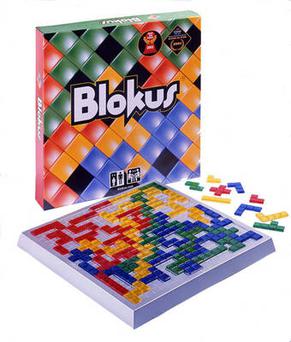
Blokus is an abstract strategy board game for two to four players, where players try to score points by occupying most of the board with pieces of their colour. Similar to jenga, the goal is to leave the other player with no plays. Utilize the different dimensions blocks to fill the board and block out the other players. The board is a square regular grid and the pieces are polyominoes. It was designed by French mathematician Bernard Tavitian and first released in 2000 by Sekkoïa, a French company. It has won several awards, including the Mensa Select award and the 2004 Teacher's Choice Award. In 2009, the game was sold to Mattel.

Tsuro is a tile-based board game designed by Tom McMurchie, originally published by WizKids and now published by Calliope Games.

Pichenotte refers to a family of several disk-flicking games, mostly French Canadian in origin, including crokinole, pitchnut, and North American carrom, which may sometimes be played with small cue sticks. Pichenotte is a Canadian French word meaning 'flick', which is derived from the European French word pichenette, also meaning 'flick'. These folk games are in the public domain, and are not subject to copyright like a commercial board game. Nor are they patented games. However, the names Pichenotte and Pitchnut are registered trademarks in the United States. The game community site Knipsbrat.com states that, like the German name Knipsbrat ('flicking-board'), "pichenotte is another name for crokinole" The Canadian game board collection at the Quebec Museum of Civilization in Quebec City includes both the square carrom-type board and the round crokinole-type game Crokinole is also called pichenotte throughout much of North America. Modern-day tournaments have been held as far apart as Tavistock, Ontario, and Santa Fe and Albuquerque, New Mexico.

Pitchnut is a wooden tabletop game of French Canadian origins, similar to carrom, crokinole and pichenotte, with mechanics that lie somewhere between pocket billiards and air hockey.

Agricola is a Euro-style board game created by Uwe Rosenberg. It is a worker placement game with a focus on resource management. In Agricola, players are farmers who sow, plow the fields, collect wood, build stables, buy animals, expand their farms and feed their families. After 14 rounds players calculate their score based on the size and prosperity of the household.

CirKis is a piece placing board game, for two to four players, invented by Phil E. Orbanes and developed by Winning Moves Games USA in 2008. However, the game is no longer in production. The game is based on a Penrose tiling.
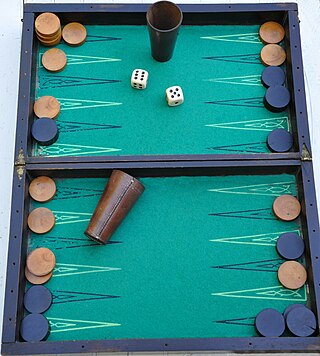
The following is a glossary of terms used in tables games, essentially games played on a Backgammon-type board. Terms in this glossary should not be game-specific, but applicable to a range of tables games.


















